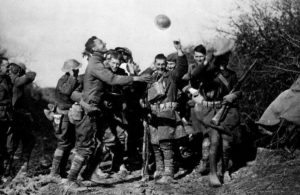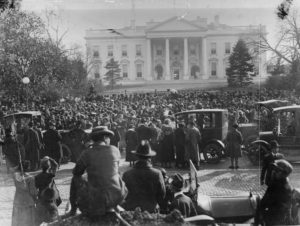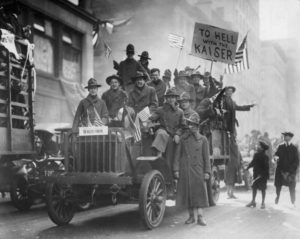Paris Peace Plot Debate
1. What happened on November 11, 1918 and how is it significant for today?
Lucy: All I know about November 11 is that it is called “Veterans Day.” But why celebrate Veterans Day when we already have a Memorial Day to celebrate American veterans?

Soldiers celebrating the news of the Armistice.
Lucy: So how did Armistice Day become Veterans Day? I don’t remember ever celebrating Armistice Day.
Gary: After World War II, a WWII veteran named Raymond Weeks, from Birmingham, Alabama, had the idea to expand Armistice Day to celebrate all veterans, not just those who died or served in World War I. Weeks led a delegation to General Dwight Eisenhower, who supported the idea of a National Veterans Day. Weeks led the first national celebration in 1947 in Alabama and thereafter annually until his death in 1985. President Reagan honored Weeks at the White House with the Presidential Citizenship Medal in 1982 as the driving force for the national holiday. Elizabeth Dole, who prepared the briefing for President Reagan, called Weeks the “Father of Veterans Day.” U.S. Representative Ed Rees from Emporia, Kansas, presented a bill establishing the holiday through Congress. President Dwight D. Eisenhower, also from Kansas, signed the bill into law on May 26, 1954. (It had been eight and a half years since Weeks held his first Armistice Day celebration for all veterans.) Shortly thereafter, Congress amended the bill on June 1, 1954, replacing “Armistice” with “Veterans,” and it has been known as Veterans Day ever since.

Celebration of the Armistice in London
Lucy: So why is Armistice Day still important, when we don’t even call it that anymore?
Gary: This year, Sunday, November 11 marks the 100th anniversary of Armistice Day. A commemoration will be held in Paris, France, which President Donald J. Trump is scheduled to attend. Armistice Day remains important because of the tremendous and continuing impact that World War I has had on the modern world. As my Great Aunt Selma once observed, the world was never the same after World War I: it became a much darker and crueler place. World War I and its aftermath directly led to World War II, and the fallout continues until this very day, especially in the Middle East.
2. How was the Paris Peace Conference important?
Lucy: I know nothing about the Paris Peace Conference of 1919, except that it ended with the signing of the Treaty of Versailles. Gary: At the Paris Peace Conference, representatives from all of the Allied nations met to determine what the terms of the peace treaty with Germany would be. The key players were the leaders of France, Georges Clemenceau; Great Britain, Lloyd George; Italy, Orlando; and the United States, Woodrow Wilson. The conference was the first time a sitting president of the United States had traveled abroad. He would be absent for 6 months.

Lucy: How was the Paris Peace Conference important? Lucy: I know nothing about the Paris Peace Conference of 1919, except that it ended with the signing of the Treaty of Versailles.
Gary: At the Paris Peace Conference, representatives from all of the Allied nations met to determine what the terms of the peace treaty with Germany would be. The key players were the leaders of France, Georges Clemenceau; Great Britain, Lloyd George; Italy, Orlando; and the United States, Woodrow Wilson. The conference was the first time a sitting president of the United States had traveled abroad. He would be absent for 6 months.
Lucy: So why didn’t the treaty work to prevent another world war?
Gary: The treaty didn’t work because (1) the Allies did not occupy Germany to strictly enforce its terms as to disarmament; (2) the reparations provisions of the treaty were way too harsh and unrealistic; (3) Germany experienced hyperinflation in the early 1920’s, essentially wiping out the savings of ordinary Germans, which paved the way of the rise of Hitler later when the Great Depression arrived; and (4) the United States refused to stay involved in keeping the peace after the Great War ended, did not join the League of Nations, and left matters to Great Britain and France, even though they had been greatly weakened by the War and were in no shape to stop the resurgence of a militaristic Germany seek revenge.
3. Could it happen again, i.e, another world war?
Lucy: I don’t think so. The United States would never let it happen again. It’s the strongest nation on the planet.
Gary: Maybe not right now. But eventually, if and when the U.S. should become weaker militarily or in its resolve, other powers will seek to fill the vacuum, and the chances for a third world war will rise dramatically.
4. What were the people in Gary’s book doing on November 11, 1918? Lucy: What I Gary’s book called?
Gary: The book is entitled The Yarrowdale Men and the Coming of World War I.
Lucy: Who were the Yarrowdale men?
Gary: They were a group of American sailors serving aboard British armed merchantmen in December 1916, who were captured in the North Atlantic by a German surface raider disguised as a neutral freighter, the Moewe (the Seagull). They were put aboard another British freighter (the Yarrowdale) and taken to Germany by a German prize crew after running the British blockade and threading its way through minefields in the Baltic Sea. The Americans were then treated as prisoners of war, even though they were neutrals, the United States not having declared war on Imperial Germany, and held in German POW camps for two to three months before being released.
Lucy: So where were they on November 11, 1918?
Gary: Some of them, after being released, joined the U.S. Army to fight against Germany in World War I. One such man was my Great Uncle Francis Sulley. He had just finished fighting in the Meuse-Argonne offensive with a trench mortar battalion when the war ended. Unfortunately, he died just two months later in France of the Spanish Flu and pneumonia. He is buried in the Meuse-Argonne American Cemetery near Verdun, France. Other Yarrowdale men went back into civilian life.
Lucy: This has been the debate for Paris Peace Plot, being published today on Amazon and Smashwords. The paperback edition is available only on our website https://edwardwarethrillers.org. Today is the 100th anniversary of the end of World War 1, or the Great War.
Lucy: A century ago at the eleventh hour of the eleventh day of the eleventh month fighting stopped.
